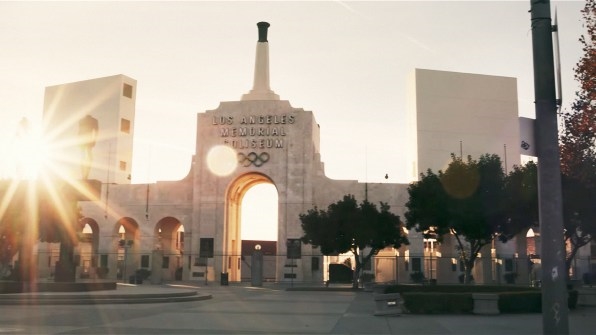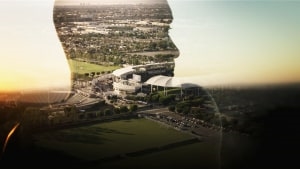America’s Olympics City: Why L.A. Is “Uniquely” Suited For Successful 2028 Games
Los Angeles is “uniquely blessed” as an Olympics host city with the kind of existing and already-planned sports venues, housing, and transit infrastructure needed to make the 2028 Games a big success, say veterans of previous Olympics.
That includes Richard Perelman, the editor-in-chief of the Official Report of the 1984 Los Angeles Olympics, the editor of L.A.’s 2012 Olympics bid proposal, and a co-editor of the city’s 2016 bid proposal. While he is not involved in any way in the 2028 Olympics, which the International Olympics Committee awarded to Los Angeles today, Perelman has a lot of opinions as to why the effort should go off smoothly, avoiding the kinds of controversies–mass cost overruns, and abandoned brand-new venues–that have plagued the cities that have hosted games in recent years.
“I would tell you that based on the reports that I have seen,” Perelman says, “this is a great day for Los Angeles, and I think it’s going to prove to be a wonderful thing for the city, the region, and the country.”
Having been through one Olympics, and been materially involved in two other bids, Perelman’s perspective was shaped by Peter Ueberroth, the president of the 1984 Los Angeles Olympics committee and former commissioner of Major League Baseball, who insisted that cities always run surpluses when hosting the Games, until losses from massive construction are taken into consideration.
“That has continued to be true,” Perelman said. “That has not changed. So I have every confidence that if [the 2028 Games] are managed properly, and that’s a big if…they’re in a position to have a surplus.”
Such a potential boost to the budget has been cited by L.A. mayor Eric Garcetti as a major reason to support the city’s bid. He recalls “the afterglow from the 1984 Games, including a profit that was steered into local school sports programs, and looks ahead to forecasts of years of economic impetus leading up to and during the Games,” wrote the Los Angeles Times back in 2015, when the bid proposal was first discussed. “‘It’s pretty rare that you get this sort of stimulus from non-governmental money that’s basically guaranteed to come to you and be spent,’ he [said.] He’s already ‘focusing on what we can do with the profits from this,’ imagining an endowment to make participation in youth sports leagues free, for instance.”
It’s not that hosting the Games is cheap. According to the New York Times, the cost of the L.A. Games could go as high as $5.3 billion though the Los Angeles Olympic committee insists the public won’t be responsible for any of that money. Further, as the LAT recently reported, the Olympics is considered likely to generate a profit of $150 million.
With the Games 11 years away, of course, it’s impossible to know if that proves to be true, and Perelman said that the city of Los Angeles and the state of California have pledged $250 million each against cost overruns.

Here’s why Garcetti’s theory could prove to be true: Los Angeles and nearby areas have a surfeit of sporting arenas, with more on the way. The region already has two major stadiums—the L.A. Coliseum and the Rose Bowl—as well as numerous pro and university arenas. There’s also a new football stadium being built as the shared home of two NFL teams, and the L.A. Clippers may be getting their own arena after sharing Staples Center with the L.A. Lakers.
On top of that, Perleman argues, both UCLA and USC have student housing that would satisfy the International Olympic Committee’s requirements for an Olympic Village.
Add that all up, he continues, and you have the makings for a future Olympics that won’t require much in the way of major construction–and therefore, mitigates the risk of massive construction cost overruns.
“When you don’t build things,” Perelman says, “you don’t have enormous expenses in the run-up years.”
At the same time, Perelman believes L.A. is in good shape to handle the kinds of massive traffic and public transit demands that an Olympics will generate, even though the city is notorious for its horrible congestion and poor transit choices.
But that reputation could start to change in the wake of recent voter-approved initiatives that will put billions of dollars into improved transportation and transit initiatives.
Los Angeles had originally sought to host the 2024 Games, but the U.S. Olympic Committee eventually chose Boston. However, Boston eventually backed out, forcing the USOC to back L.A. In the end, a deal struck between the IOC and the USOC resulted in Paris being awarded the 2024 Games, and Los Angeles winning 2028 hosting duties.
Perelman says it’s good that L.A. got the 2028 Olympics, because he doesn’t believe all the transit and traffic improvements will be in place by 2024. By four years later, he thinks everything will be finished and adopted by the community, meaning that kinks will have been ironed out and people will have learned how to efficiently use the systems.
Neither anyone from the L.A. Mayor’s office nor anyone from LA2024 (the city’s still-not-renamed Olympics committee) responded to a request for comment. But in a press conference on Monday afternoon, Garcetti said that by 2028, the city will have spent close to $30 billion on public transportation, including finishing subway lines, and completing work on Los Angeles International Airport.
Not everyone is on board with L.A. being host to the world, of course. An organization called NOlympics LA opposes bringing the Games to Los Angeles because “it will be nothing short of a wide-reaching, incalculably destructive media party for millionaires and billionaires. The Olympics puts the interests of the mega-rich and corporate brands above the interests of athletes, fans, and working people in the cities it commandeers.”
Further, NOlympics LA argues, “Should LA host the Olympics, we will see wide-ranging human rights’ violations and the forfeiture of our city to the interests of contractors, developers, media corporations, and the special interests who designed the bid. Preparing for and hosting the Olympics will place unnecessary financial stress on the citizens of LA while also disrupting the lives of the several million people who live and work here.”
But Perelman thinks that the controversies that have swirled around the Olympics in recent years–especially in Rio in 2016, where new venues constructed at exorbitant cost now sit empty–have taught the IOC some valuable lessons. As a result, he says, there will be an increased emphasis on ensuring that future Games are paid for with private funding and not with public money. Absent that, he says, the IOC’s “not going to get any bidders. No one’s going to want the Games.”
And though he’s a huge supporter of the city hosting the Games, Perelman recommends plenty of scrutiny of the people and organizations behind the L.A. Games. “If I was an anti-Olympics activist, I’d be looking closely at who is the management,” Perelman says, “what is their attitude towards money, how big is their staff, and how much money are they spending?”
A plethora of existing and already-planned sports venues, plus voter-approved funding for new transit and traffic infrastructure, could make L.A.’s experience the opposite of Rio’s.
Los Angeles is “uniquely blessed” as an Olympics host city with the kind of existing and already-planned sports venues, housing, and transit infrastructure needed to make the 2028 Games a big success, say veterans of previous Olympics.
Fast Company , Read Full Story
(19)













